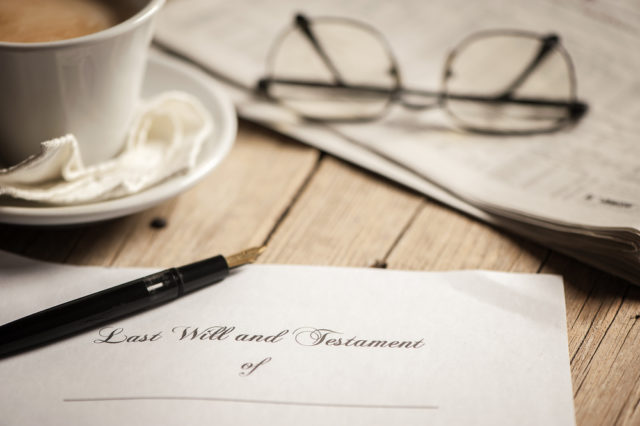By Elizabeth Burke :: Websters Lawyers
5 Reasons why you should have a Will
No one really wants to consider the prospect of their own death. It’s just too confronting. And it’s not going to happen to you until you’re old, so you can put off thinking about it until later. Right?
Well, it goes without saying that we don’t know what might happen to us. There are just so many things that are outside our control. But what we can make sure of is that if the unexpected happens, we can make things so much easier for our loved ones by having a proper will.
Not just some random thoughts scribbled on a scrap of paper, but a will that has been properly drafted, signed, witnessed and dated. One that complies with legal requirements. Here are our top five reasons why you should have a valid will.

1. Who gets the kids?
If you have children, you know how special they are. You’d do anything for them, so it makes sense to appoint guardians to care for them if both parents die, for example in a car accident. The best way to do this is in a will.
Also, for a single parent, naming guardians becomes hugely important. The last thing you want is your grieving children to be shunted from home to home until permanent care can be organised.
A will is compelling evidence of your intentions and shows that you carefully considered what arrangements should be made for your children.
2. Giving it away
You don’t want to be giving away all your hard-earned assets and cherished possessions to just anyone.
If you die intestate, which means you haven’t left a will, you can’t control who gets what. There are strict legal requirements for distributing an intestate estate.
For example, if you separated from your husband but never got around to divorcing, he could be entitled to most of your estate. Even if you have divorced, he may still be able to claim the lion’s share.
But if you have a will, you are able to dictate who gets your belongings and you can provide for any children that you may have.
3. Directing traffic
Someone has to take on the responsibility to distribute your estate after you die, including paying bills and debts. It’s a little bit like the police directing traffic.
If you die intestate, an administrator has to be appointed to take on this role. It may be someone close to you, for example a husband or child. But if there’s no one available or willing, the Public Trustee will take over and the estate will be charged a fee based on its value as well as legal fees. This can really add up and will erode the estate, meaning that the beneficiaries will get less.
If you have a will, you can appoint an executor to do this job. You can appoint someone who knows you well and, more importantly, you can appoint an alternative executor, meaning that if the first executor is unable to act, you have put in place a Plan B without having to change your will.
4. Duking it out
Money can do strange things to people, particularly when it comes to inheritance. If your beneficiaries believe they’re more entitled than anyone else, they may want to fight to get their hands on more of your estate.
If you die intestate, you haven’t made it clear who you want to inherit what. Even if you’ve told people that you want them to have specific things, this will not be enough evidence for a court to decide that they were your intentions.
When you have a will drafted, you sit down with a solicitor and carefully go through all of your intentions. The solicitor will be able to advise you about whether your have made proper provision for everyone, which helps to limit any possible inheritance claims that may be later made against your estate.
5. Make it quick and easy
The best outcome for your loved ones is a quick and easy distribution of your estate.
If you die intestate, an administrator must be appointed and there is a higher risk of claims being made against your estate. It can take years to resolve some claims. And because the legal fees usually come out of the estate, there may not be much to inherit at the end of the process.
A will is taken as evidence of your intentions, so the process of getting probate granted and distributing the estate is usually more straightforward and there is less risk of claims being made against the estate.
Other issues ::
There are some other really important considerations when it comes to wills. Legal advice is crucial as this is the best way to minimise the risk of any claims being made against your estate.
Not all of your assets are included in your estate. It is important to be clear about which are included and which are excluded. Legal advice can help you sort this out and may give you an opportunity to change the way you hold your assets before you die.
A will must be signed in a certain way and witnessed in a certain way. Any errors may invalidate the will, meaning that probate is refused and the estate would be treated as intestate.
This means that it’s really important that the will is executed properly. The best and simplest way to do this is with the help of an experienced wills lawyer.
Change means change ::
It is also essential that you update your will every time there is a major event in your life. For example:
:: You move house.
:: You have a child or children.
:: You get married.
:: You have been in a domestic partnership (including de facto relationship) for two years or more.
:: You separate from your spouse or domestic partner.
:: You get divorced.
This is the best way to ensure that your wishes can be carried out after you’re gone. Even if you think you’re going to live a long and healthy life, you never know when death will come a-calling. When that day arrives, it will be hard enough for your loved ones to cope. There’s no point in making it harder on them by not having a valid will.
Websters Lawyers have a great team of lawyers who are experienced in all aspects of wills and estate planning. Contact us now for a free initial consultation.
This article provides general information only. For advice specific to your needs, you should consult a lawyer.
Websters Lawyers work for you
:: FACEBOOK :: WEBSITE :: TWITTER
:: Sponsored ::









